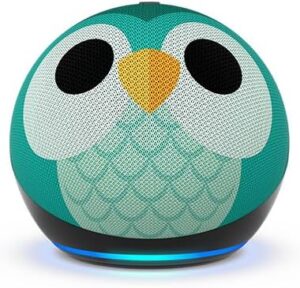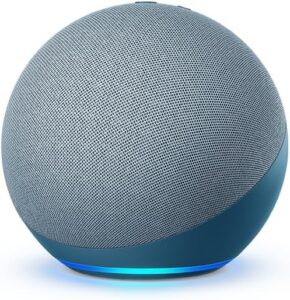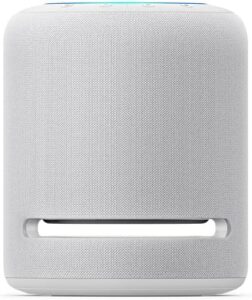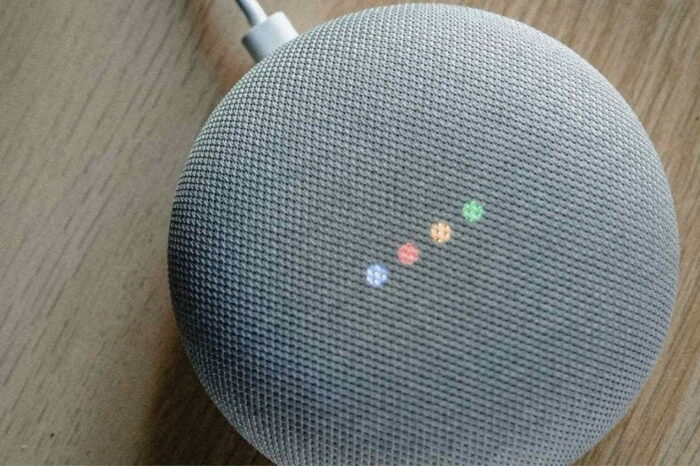Smart Speaker sales have seen steady growth year on year. In the last three years, there has been a steady increase in sales seeing a whopping 40 percent increase each year with smart speaker sales now totaling more than 100 million worldwide.
So, are smart speakers safe for you? Yes they are. If you take a little time to understand exactly what this tech is doing, what it’s listening for and you’re prepared to spend a little time to correctly configure the privacy and security settings then you have nothing to fear.
Worst case, if you’re still not convinced about are smart speakers safe for you, then you could just disable the microphones and enjoy listening to your favorite songs.

In this article we cover the latest smart speaker tech, take a look at the benefits and disadvantages of smart speakers and explore if smart speakers are really listening to you and offer some insights towards are smart speakers safe for you.
Echo Dot Smart Speaker With Alexa
Charcoal, Deep Sea Blue and White. Alexa skills and features, dual band WiFi and Bluetooth.
Are Smart Speakers Always Listening?
Sure it may appear that your smart speaker’s voice assistant is always eavesdropping on you, however, that’s not exactly true. You see, it is listening to you, but it’s listening for the wake-up command – you know, “Hey Alexa”, “Hey Siri” or “Hey Google” for example.
A smart speaker with a voice assistant offers fantastic possibilities however, for many people privacy concerns do come to mind. If a device reacts and takes action based on voice commands, it has to be listening to you all the time right? And it is – but perhaps not in the way you think.

Once the smart device hears the wake-up command only then does it start to record. So you may be wondering, how does it know I said a wake-up command?
Typically a good quality smart speaker will have multiple microphones built in, the Amazon Echo for example contains seven different microphones to capture voice from various distances and under various conditions like heavy background noise.
Talking about microphones, most good quality smart speakers now come with the option of disable or mute the microphones until you want to use it. This takes away the usability for sure, but it’s there as an option should you want to use it.
When it comes to the actual command word, smart speakers rely on artificial intelligence or AI for short to train their smart speaker software to recognize the wake-up command word using many different variations and patterns of the word.
So you should now have a little more insight and understanding and feel a little more comfortable around smart speakers always listening. It’s important to understand that although it appears that they are constantly listening to our every word, that is not the case, but rather they are listening for the magic wake-up command word.
I do feel it’s important to touch on the recording aspect mentioned above. This feature is perhaps not commonly understood. When a smart speaker does wake up any commands can potentially be recorded to help improve the digital voice assistant’s response and actions.
What most smart speaker users aren’t aware of is that if their commands are recorded then there is typically an option to delete the recordings either manually or via voice command.
Echo With Premium Sound, Smart Home Hub, And Alexa
Charcoal, Glacier White or Twilight Blue. Alexa skills and features, Zigbee smart home hub, dual band WiFi and Bluetooth.

What Is The Most Secure Smart Speaker?
In reality, if you opt for one of the big-name brand smart speakers from Google, Amazon, Apple, Sonos etc. then the likelihood is that you will be able to configure the device security to a point where you feel it’s secure.
Truth be told, for you to get the most out of your smart speaker you will have to give up a little privacy just like you probably are doing already with similar smart tech within your home.
That being said, you should make sure you take advantage of all the security features and protections on offer, for example:
- Configure any privacy settings to reduce the amount of data the device can collect, what it can be used for and how long it can be kept
- Disable storage of voice recordings
- Consider disabling any location services options
- Ensure the device you purchase has the latest and greatest WiFi and Bluetooth versions
- Use a strong password or passphrase
- Consider muting the microphone when not in use
- Keep the software up to date
- Enable parental controls and use good internet safety rules
Studio High-fidelity Smart Speaker With 3D Audio And Alexa
Charcoal and Glacier. Alexa skills and features, Zigbee smart home hub, dual band WiFi and Bluetooth.

Most people purchase a smart speaker to play and listen to music. Playing music on a smart speaker is so easy. Gone are the days of scrolling through hundreds of songs.
One command aka skill to the voice assistant like Alexa from Amazon or Siri from Apple and your favorite high school song will be blasting out of the speaker. This is probably the biggest benefit of owning a smart speaker.

Being able to link multiple smart speakers together wirelessly throughout your home and have the same song play in various locations is another great benefit. This would be particularly useful if you intend to throw a party, however, your kids may have something to say about your choice of music if it’s not a party situation.
Not familiar with a song or artist that’s playing? Not a problem, your voice assistant has your back. Ask what’s playing and it will tell you everything you need to know about the song.
Moving the focus away from listening to music you will find there are many other fantastic benefits on offer like smart home automation.
Your smart speaker digital voice assistant can be used to control compatible smart home devices like smart lights, smart TVs, and smart thermostats. With a simple verbal command you can instruct your voice assistant to turn on or turn off your lights, set a room at a specific temperature and much more.
What Are The Disadvantages Of A Smart Speaker?
The biggest drawback and disadvantage of a smart speaker is voice recognition. Artificially intelligent voice recognition technology is far from perfect. However, as time goes by a voice assistant does tend to learn and adapt to your voice.
Another disadvantage of a smart speaker is platform selection. Despite all smart speakers having WiFi and or Bluetooth connectivity options, that doesn’t mean they all talk or play nicely together.
Another point to note is that it also doesn’t mean that your smart speaker of choice will talk to or play nicely with your existing smart home tech like your smart TV or smart thermostat.
Once you commit to Alexa, Siri, or any of the other popular smart speaker voice assistants, you will be locked in with that decision going forward.
Frequently Asked Smart Speaker Questions
Hopefully, I have answered all of your questions related to, are smart speakers safe for you. However, you may still have other questions surrounding smart speakers. If you do, below I have answered some common frequently asked questions
Is there a child friendly smart speaker?
What is the best smart speaker for privacy?
Can a smart speaker play the radio?
What smart speaker has the best sound?
Final Thoughts On Are Smart Speakers Safe For You?
So, in conclusion, smart speakers aren’t listening to your private conversations or your gossip about the next-door neighbor, they’re simply listening for a specific wake-up command.
Yes, some smart speakers may store recordings but selecting a big-name brand will afford you the option to control that feature if it exists.
So to answer the question, are smart speakers safe for you? I would answer that question with a resounding yes they are!

